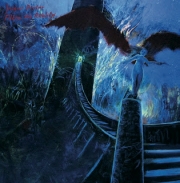Just when you think you’ve heard it all before, a true one-off arrives. Jacques Brodier is a musician, inventor, visual artist, writer – anything, it seems, that will help him realise the vision he’s held for decades. He’s been operating in Le Havre, on the other side of the Channel, since the 1970s, but Filtre De Réalité is the first LP of his work to be released. And it is something else. His vertiginous sleeve art and playful introductory notes prompt your imagination to take flight. But they can’t prepare you for the sound that emerges, a glorious surprise in our everything-available age.
If you enjoy classic concrète, early electronic compositions or ambient noise, you should feel at home in Brodier’s spacious audio worlds. Likewise, if you’re old enough to have dialled idly through the shortwave frequencies on your tranny (as British comics still called portable radios in the 1980s) you’ll appreciate the pull of the ineffable realm he’s thrown himself into. But beyond those very broad pointers, you’re on your own. The titular Reality Filter is, well, the man himself introduces it better than I could, but it involves home-made radio receivers, optical modulators, banks of analogue electronic equipment and "a set of vibrating strings excited by the sound of shortwaves". The poetic gist is that it allows him to tune in to signals we habitually miss, and translate them into something like music. The physical fact is a constellation of extraordinarily rich tones and textures that you won’t hear elsewhere.
Although its eight tracks were recorded years apart, Filtre De Réalité feels like a sustained voyage deep into one unexplored space. Dialing up and down the frequencies, Brodier uncovers nameless, sourceless vibrations – some close to vocal tones, others close to fireworks – with soft percussive banging, dubwise echoed crashes and distorted string-like sounds dancing in the peripheries. The uncanny almost-voices produced by his rig are a recurring focal point – a warm but alien chorus of moans, wails and roars only a little like winds howling down a chimney.
It’s a great exercise in what Joe Banks calls Rorschach audio. These unnameable sounds seem almost familiar, and the listener can’t help but impose their own order and associations upon them (which will be different to Brodier’s, mine and anyone else’s). ‘Chanson dans les flammes’ feels to me something like a passage through an alien jungle environment – no flames involved. Distorted light operatic music fleetingly conjures The Caretaker, although Brodier’s work seems to live solely in the present tense. Dampened voice-like tones and liquid wobbles raise Gavin Bryars’ The Sinking of the Titanic and the in/visible surface of the Predator respectively. When the vocal jabber on ‘La Nuit des Crapauds Exterieurs’ passes through bass frequencies, my monoglot Brit mind flashes back to Alpha 60 from Alphaville. But these are all the (incidental) specifics I can offer.
On the sultry second side the acousmatic miasma thickens. What may once have been a military tattoo floats through ‘Le Supplice des tremblures de Noyaux’ like firecrackers, then distant thunder. Sandpapery scrapings gradually come into focus as the edges of speech on a distorted radio channel. Low creaks build tension on ‘Le convoi des Trouilles’ until ersatz tintinnabulation warps into something like angelic voices. The ‘Monstre de brouillard’ breaks down to fantastically textured electronic rhythm, keeping it in the pocket like electric Miles, until rounds of beastly low roars, luminous ringing and howling gales fly off into the void.
Brodier’s inspirations seem to range from the big bang to Borges, and from Lautréamont to Leary (whose notion of the reality tunnel may be key). As that mixed bag might suggest, his approach is very intuitive – he talks of improvising with his source sound material like a "futuristic jazzman", and a sense of free play and discovery animates Filtre De Réalité throughout. If the experience of letting it wash, crash and flap over me brings another cultural experience to mind at all, it’s being absorbed in David Lynch films. As hackneyed a synonym for surrealism as Lynch has become, there’s a stronger synchronicity here: both find a familiar low hum and follow it into a zone beyond language or logic, where everything feels somehow clearer.
Filtre De Réalité _is available from Penultimate Press for the very reasonable price of £12.50. Vinyl only, limited to 400 copies_


